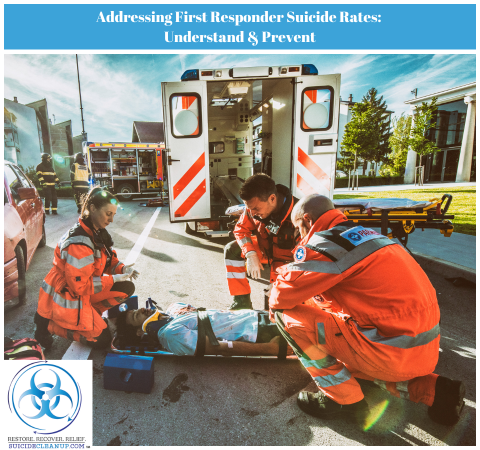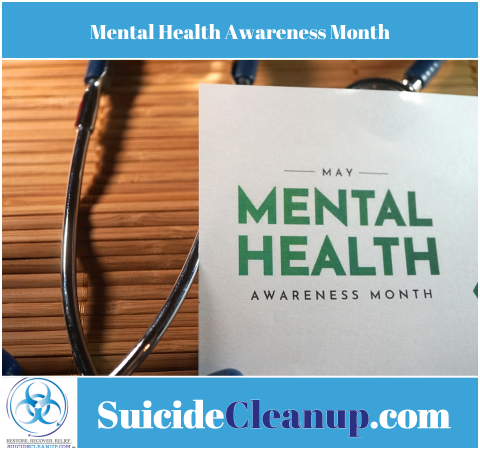
Addressing First Responder Suicide Rates: Understand & Prevent
April 30, 2024
The Latest Study On LGBTQ Suicide Rates
June 28, 2024Mental Health Awareness Month, observed every May, is a crucial period dedicated to raising awareness about mental health issues, reducing the stigma associated with mental illnesses, and promoting mental well-being. Established in 1949 by the Mental Health America (MHA) organization, this month-long observance seeks to educate the public, advocate for policies that support mental health, and celebrate the efforts of those who work in the mental health field.
Over the decades, Mental Health Awareness Month has grown in scope and impact, fostering a greater understanding of mental health conditions and encouraging individuals to seek help when needed. The initiative brings together mental health organizations, advocates, and individuals to engage in activities, share information, and create supportive communities.
The primary goals of Mental Health Awareness Month are:
- Raising Awareness: One of the key objectives is to inform the public about mental health issues, including the prevalence of mental illnesses, the symptoms to look out for, and the available treatments. By increasing awareness, the initiative aims to educate people on the importance of mental health and the impact it has on overall well-being.
- Reducing Stigma: Mental health stigma often prevents individuals from seeking help due to fear of judgment or discrimination. Mental Health Awareness Month strives to challenge and change these negative perceptions by sharing personal stories, providing factual information, and highlighting the experiences of those living with mental health conditions. Reducing stigma is essential for creating an environment where people feel safe and supported in discussing their mental health.
- Promoting Mental Well-Being: Beyond addressing mental illnesses, the month focuses on promoting positive mental health practices. This includes encouraging self-care, stress management, and healthy lifestyle choices that contribute to overall mental well-being. The initiative emphasizes the importance of mental health as an integral part of a person’s overall health.
Mental Health Awareness Month plays a vital role in fostering a more informed and compassionate society. By shining a spotlight on mental health issues, the initiative helps break down barriers to care and support, ensuring that individuals feel empowered to seek help. It also encourages communities to come together to support mental health initiatives, advocate for better mental health policies, and provide resources for those in need.
In summary, Mental Health Awareness Month is an essential observance that promotes understanding, reduces stigma, and champions mental well-being. It serves as a reminder that mental health is a critical component of overall health, deserving of attention, care, and support year-round.
The Role of Suicide Cleanup in Mental Health
Impact of Suicide on Mental Health
The emotional and psychological effects of suicide are profound and far-reaching, impacting not only the individual who has taken their own life but also their families, friends, and communities. Survivors can deal with a wide range of intense emotions, including:
- Grief and Loss: The sudden and tragic loss of a loved one to suicide often results in deep grief and a profound sense of loss. This grief can be more complicated than other types of bereavement due to the nature of the death.
- Guilt and Shame: Survivors may struggle with feelings of guilt, questioning whether they could have done something to prevent the suicide. They may also experience shame due to the stigma surrounding suicide.
- Anger and Confusion: Anger towards the deceased or others, as well as confusion about why the suicide occurred, are common reactions. These feelings can be overwhelming and difficult to process.
- Trauma: For those who discover the body or are closely involved with the deceased, the trauma can lead to symptoms of post-traumatic stress disorder (PTSD).
- Social Isolation: The stigma associated with suicide can lead to social isolation as survivors may feel misunderstood or judged by others. This isolation can further exacerbate feelings of grief and loss.
Importance of Professional Cleanup
In the wake of a suicide, the physical scene left behind can serve as a stark and painful reminder of the traumatic event. This is where professional suicide cleanup services play a crucial role in the healing process. The importance of professional cleanup includes:
- Removing Physical Reminders: Professional cleanup teams are trained to thoroughly and safely remove all traces of the traumatic event. This includes cleaning and sanitizing the affected area, which can help survivors begin to move forward without the constant physical reminders of their loss.
- Ensuring Safety: Suicide scenes can pose health risks due to the presence of biohazardous materials such as blood and bodily fluids. Professional cleanup services use specialized equipment and follow strict protocols to ensure the area is safely decontaminated, protecting the health of those who will re-enter the space.
- Providing Compassionate Support: Professional cleanup teams are often trained to handle these situations with sensitivity and compassion. Their presence can provide a sense of support and relief to grieving families, who may find the task of cleaning up after a suicide to be both physically and emotionally overwhelming.
- Allowing Loved Ones to Focus on Healing: By taking on the burden of cleaning up, professional services allow loved ones to focus on their emotional and psychological healing. They can spend time mourning and processing their loss without the added stress of dealing with the physical aftermath.
Professional suicide cleanup services are an essential component in the broader context of mental health support. They help mitigate the trauma for survivors, provide a safe and clean environment, and allow families and friends to begin their journey towards healing without the burden of handling the aftermath themselves.
Mental Health Challenges in the Cleanup Industry
Stress and Trauma for Cleaners
Suicide cleanup professionals face unique mental health challenges due to their frequent exposure to traumatic and emotionally charged scenes. The nature of their work requires them to handle environments that many people would find distressing or overwhelming. Key mental health challenges include:
- Exposure to Traumatic Scenes: Regularly encountering the aftermath of suicides and other traumatic events can lead to significant emotional and psychological strain. Cleaners may develop symptoms of secondary traumatic stress or compassion fatigue as a result of their repeated exposure to these harrowing situations.
- Mental Resilience: The ability to maintain mental resilience is crucial for those in the cleanup industry. Professionals must find ways to cope with the stress and emotional toll of their work while continuing to perform their duties effectively. This often requires a high level of emotional strength and stability.
- Emotional Detachment vs. Empathy: Balancing emotional detachment with empathy can be challenging. While detachment can help cleaners manage their own emotional responses, maintaining empathy is essential for providing compassionate service to grieving families. This balancing act can be mentally exhausting.
- Stigma and Isolation: The stigma surrounding their work can lead to feelings of isolation. Cleaners may find it difficult to discuss their experiences with friends or family members who do not fully understand the nature of their job. This can result in a lack of social support and increased feelings of loneliness.
Support Systems for Cleaners
Given the intense nature of their work, it is crucial for suicide cleanup professionals to have access to robust mental health resources and support systems. These support mechanisms help cleaners manage the stress and trauma associated with their job, promoting their overall well-being. Key support systems include:
- Counseling Services: Access to professional counseling or therapy can provide cleaners with a safe space to process their experiences and emotions. Regular sessions with a mental health professional can help mitigate the effects of secondary traumatic stress and compassion fatigue.
- Debriefing Sessions: Structured debriefing sessions after particularly traumatic jobs can be beneficial. These sessions allow cleaners to discuss their experiences, share their feelings, and receive guidance on coping strategies from trained professionals or experienced peers.
- Peer Support Groups: Peer support groups offer a platform for cleaners to connect with others who understand the unique challenges of their job. Sharing experiences and coping strategies with colleagues can provide a sense of camaraderie and mutual support, reducing feelings of isolation.
- Training and Education: Ongoing training on mental health awareness and resilience-building techniques can equip cleaners with the tools they need to manage stress and trauma. This can include workshops on self-care practices, mindfulness, and stress management techniques.
- Employer Support: Employers play a critical role in supporting the mental health of their employees. Providing access to mental health resources, creating a supportive work environment, and promoting a culture of open communication about mental health can significantly impact the well-being of cleanup professionals.
Access to counseling, debriefing sessions, peer support groups, and continuous training are essential components of a comprehensive support network that promotes the well-being and resilience of those in the cleanup industry.
Conclusion
Mental Health Awareness Month serves as a vital reminder of the importance of mental health in our lives. The emotional and psychological impact of mental health issues, particularly suicide, extends beyond the individual to families, friends, and entire communities. Professional suicide cleanup services play a crucial role in helping loved ones begin the healing process by removing the physical reminders of trauma, while also highlighting the mental health challenges faced by those in the cleanup industry.
Supporting the mental well-being of everyone involved is essential. This includes recognizing the stress and trauma experienced by suicide cleanup professionals and ensuring they have access to necessary mental health resources. Mental health awareness and support systems are not just beneficial but necessary for creating a compassionate and resilient society.




